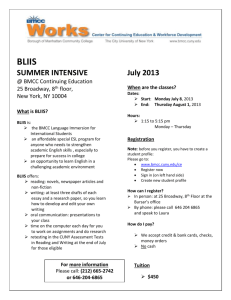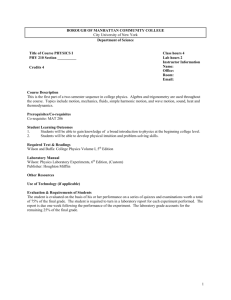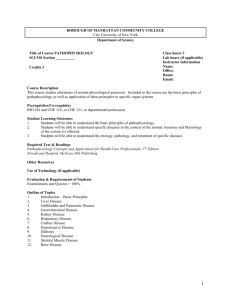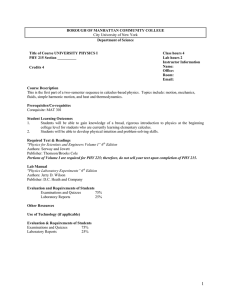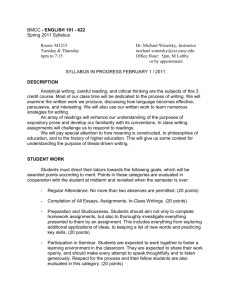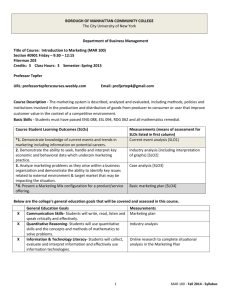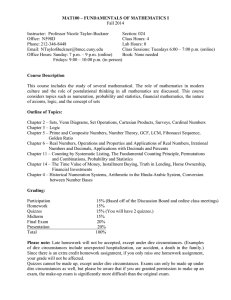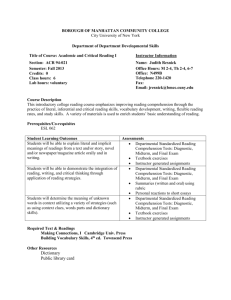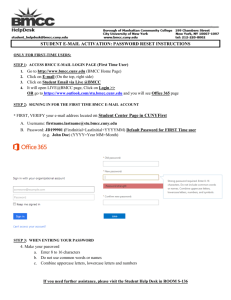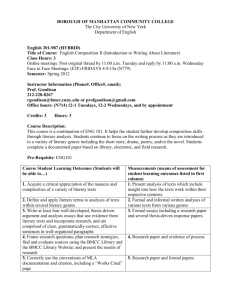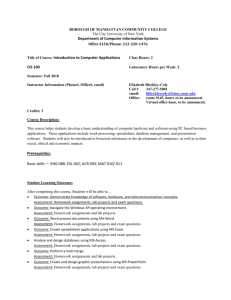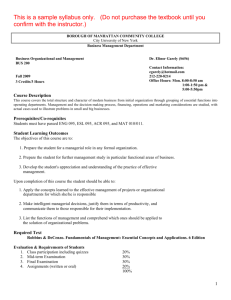Sample Syllabus
advertisement
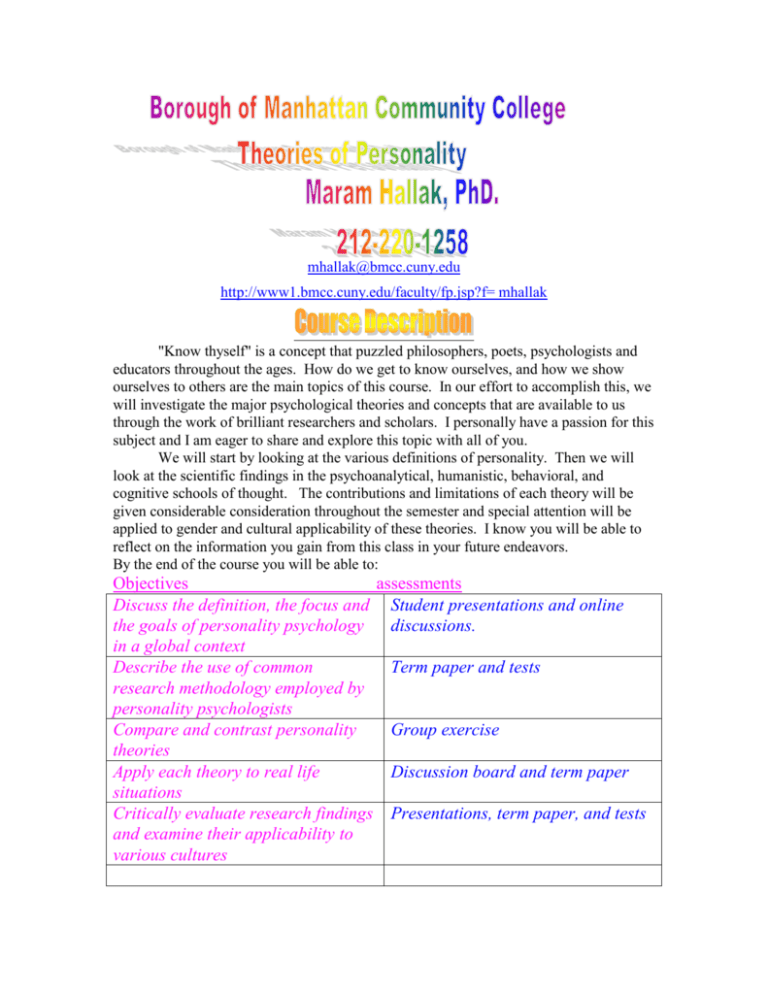
mhallak@bmcc.cuny.edu http://www1.bmcc.cuny.edu/faculty/fp.jsp?f= mhallak "Know thyself" is a concept that puzzled philosophers, poets, psychologists and educators throughout the ages. How do we get to know ourselves, and how we show ourselves to others are the main topics of this course. In our effort to accomplish this, we will investigate the major psychological theories and concepts that are available to us through the work of brilliant researchers and scholars. I personally have a passion for this subject and I am eager to share and explore this topic with all of you. We will start by looking at the various definitions of personality. Then we will look at the scientific findings in the psychoanalytical, humanistic, behavioral, and cognitive schools of thought. The contributions and limitations of each theory will be given considerable consideration throughout the semester and special attention will be applied to gender and cultural applicability of these theories. I know you will be able to reflect on the information you gain from this class in your future endeavors. By the end of the course you will be able to: Objectives assessments Discuss the definition, the focus and Student presentations and online the goals of personality psychology discussions. in a global context Describe the use of common Term paper and tests research methodology employed by personality psychologists Compare and contrast personality Group exercise theories Apply each theory to real life Discussion board and term paper situations Critically evaluate research findings Presentations, term paper, and tests and examine their applicability to various cultures Required readings Feist, J. & Feist, G. (2007). Theories of Personality (7th edition). McGraw and Hill: New York, NY. I chose this text because it provides a thorough investigation of the main concepts that Psychologists struggled with over the years in an interesting and informative manner. In addition, the author examines these concepts and their applicability in other societies and cultures. This will help us with achieving our objective regarding the multi-cultural awareness that we adopted. Freud, S. (1918). Dora. A case of hysteria One of Freud’s best wrting cases highlighting his theory and rationalizing his methods. Reading it from the original author, specially one that is a talented writer and gifted investigator, will provide you a better understanding of psychoanalyses and the psychoanalyst behind it. Your final grade will be based on: Four (4) tests: each is 5 points worth for a total of 20 points Each test will consist of 20 Multiple-choice questions from the text, readings and lectures. The exams’ purpose is to ensure that you meet the objectives of the course. Three areas of accomplishments will be tested: Memorizing concepts and definitions; relating and critically analyzing concepts; and memorizing concepts and definitions. The test will be timed for 40 mintues and you can take it any time on or before the due date. i usually make the exam available at least a week before due date to allow flexibility. check test schedule for due dates. You are not supposed to use your books or notes or help from the web. i am sure you can see that i have no way to enforce that. so i just make the test in such a way that if you do not know and know and know the material, it will take you more than forty minutes to look up the answers. i also add other restrictions as you will find out. an example is randomize the questions and answers (so if you plan to take it with your friends over pizza, think again. :-). The fine print (important) Since it is my belief and experience that hard work produces better accomplishments, and teaches us to rise to demanding expectations, please be prepared for somewhat challenging exams. Don't wait to the last minute to study and keep up with your readings. Ten (10) assigned list discussions: (10) chapter posts and comments to the list, each 2 points for a possible total of 20 points. Each week, you are requested to analyse and apply the chapter theory to “The case of Stan” and post it on the discussion board corresponding forum. The format is open, make it fun for yourself and a learning experience for your peers. The assigned comments must be about 500 words and must be posted on or before due date in order to earn credit. You will be offered a total of 11 posts; but you are requested to respond to 10. this gives the student a chance to skip a discussion and still receive a perfect grade. Each successful post is worth 2 points. Your posts will be "graded" on a pass/ try again/ no credit basis. Additionally, you are required to read all other posts, and make at least one comment or observation each week-e.g., something you have read or noted, thoughts about the material, reactions to someone else's post, or further discussion of the topic. Be considerate of others. sometimes i send follow up questions that will specifically ask you to answer (some questions i might put in my reply to you but are general and include responses from others). make them reasonable in length; remember we all have to read all of them and if the post is too long it is my experience that we first get lost in it, and second give us a headache. You should feel free to post additional comments at any time and it should be easy for you to do so since this is a discussion class where a large percentage of learning depends on collaborations. group report: twenty (20) points You and your assigned group will be requested to report on one theory chosen by the instructor. Each member of the group is given a specific task while participating in the Jigzzaw Puzzel game found in the assignment section. Please check course plan for due dates and dates for submissions and exchanges. Term Paper: twenty (20) points You are required to write a term paper, following the guidelines in the assignments section, that consist of 6 pages. Presentation: twenty (20) points You are required to present your term paper to your peers in about 15 minutes and at a specific date and time agreed upon by the student and the instructor. Special requests will be accommodated to the best of our scheduling ability. College Attendance Policy 1. Absences At BMCC, the maximum number of absences is limited to one more hour than the number of hours a class meets in one week. For this course, you are allowed seven hours of absence (not seven days). In the case of excessive absence, the instructor has the option to lower the grade or assign an “F”, “R”, or“WU” grade. 2. Class Attendance If you do not attend class at least once in the first three weeks of the course and once in the fourth or fifth weeks, the Office of the Registrar is required to assign a grade of “WU”. Attendance in both regular and remedial courses is mandated by policy of the City University of New York. Instructors are required by New York State law to keep an official record of class attendance. Academic Adjustments for Students with Disabilities Students with disabilities who require reasonable accommodations or academic adjustments for this course must contact the Office of Services for Students with Disabilities. BMCC is committed to providing equal access to all programs and curricula to all students. BMCC Policy on Plagiarism and Academic Integrity Statement Plagiarism is the presentation of someone else’s ideas, words or artistic, scientific, or technical work as one’s own creation. Using the idea or work of another is permissible only when the original author is identified. Paraphrasing and summarizing, as well as direct quotations require citations to the original source. Plagiarism may be intentional or unintentional. Lack of dishonest intent does not necessarily absolve a student of responsibility for plagiarism.
